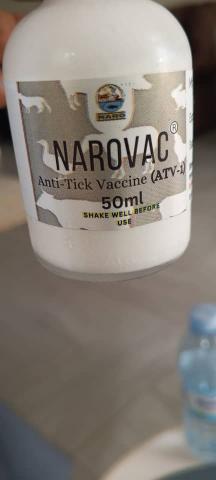UGANDA MAKES BREAKTHROUGH WITH LOCALLY DEVELOPED ANTI-TICK VACCINE, NAROVAC ATV1
Kazo District – Uganda has successfully developed and tested a locally manufactured anti-tick vaccine named NAROVAC ATV1, marking a significant milestone in the fight against ticks and tick-borne diseases in livestock.
Developed by the National Agricultural Research Organisation (NARO), the NAROVAC ATV1 vaccine has shown promising results during trials conducted on multiple farms across Uganda, including Kazo District. The vaccine is available in injectable form and the oral form is still under research.
This vaccine is designed to trigger an immune response in cattle, causing ticks that feed on vaccinated animals to die thus significantly reducing tick populations over time.
The injectable form is administered intramuscularly in the neck region, while the oral version still under research can be given directly or mixed with cattle feed.
The injectable vaccine was evaluated on five major farms representing Uganda’s diverse ecological zones: Mbarara ZARDI Farm in Mbarara City, Kiburara Prison Farm in Ibanda District, Isimba Prison Farm in Masindi District, Maruzi Livestock Research Station in Apac District and Nabuin ZARDI Farm in Nabilatuk District.
Additionally, in Kazo District, three farmers participated in the trials, with the standout being Mr. James Mastiko’s farm in Buhenda Village, Rwamuranga Parish, Kazo Sub-county. Mastiko allowed NARO to use his farm as a demonstration site. He testified that the vaccine, when used alongside proper farm management practices, has been highly effective in controlling ticks.
A high-profile visit to Mr. Mastiko’s farm brought together stakeholders from NARO, Kazo District leadership and farmer representatives from districts such as Isingiro, Sheema, Kiboga, Kiruhura, Ntungamo among others. After the visit, stakeholders gathered at Kazo Compassion Hall in Kazo Town Council.
Zefrine Tumwesigye, the District Production Officer; John Baptist Asimwe Principal Agriculture Officer and Nabimanya Alfred the Acting District Veterinary Officer, spoke to farmers at Compassion Hall. They thanked NARO for selecting Kazo as a trial site and emphasized that the partnership between farmers, the district and researchers was essential to the project’s success.
Keith Bahemuka, Deputy Chief Administrative Officer (DCAO) who was representing the CAO, urged farmers to strictly adhere to vaccine usage guidelines to ensure its effectiveness.
Dr. Solomon Emergo Kiggundu from the National Livestock Resources Research Institute (NaLIRRI ), confirmed that the trials have shown positive results. He emphasized NARO’s commitment to continuous research and farmer engagement for further refinement of the vaccine.
Deputy Resident district commissioner Bazil Mugisha Paddy advocated for the subsidization of the vaccine, stressing its potential to benefit all farmers.
Annually, the total global costs linked to ticks and tick-vectored pathogens in cattle range between USD 13.9 billion and USD 18.7 billion. In Uganda, studies estimate that losses of over USD 1.1 billion occur annually due to ticks and tick-borne diseases including East Coast Fever (amashuyo), babesiosis (redwater), anaplasmosis (kashanku), and coccidiosis. At the farm level, 80% of total annual expenses incurred in managing all cattle diseases are associated with controlling tick-borne diseases.
NAROVAC ATV1 now joins a global line-up of anti-tick vaccines such as TickGARD (Australia) and Gavac (Cuba). As Uganda's first locally developed anti-tick vaccine, it represents a major scientific and agricultural breakthrough aimed at enhancing livestock productivity and resilience. It is also a convincing testament to the advocacy of President yoweri Kaguta Museveni, who has consistently championed science and innovation in Uganda.
Tinyefuza Naboth -Kazo District Communications Officer

